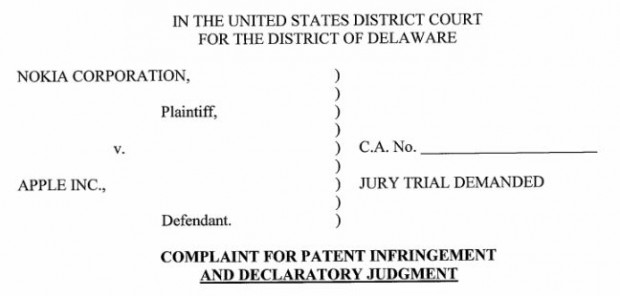
Disclaimer: Jeremy Kessel has a J.D., but is still waiting for his (July 2009) California Bar Exam results. Thus, he is not (yet) a licensed attorney. Barry L. Cohen, who also shares some insights below, is a licensed attorney. Regardless, this post is not meant as legal advice or analysis and should not be construed as such.
As many of you are aware, Nokia filed a lawsuit against Apple last week in the Federal District Court in Delaware. Nokia’s complaint alleges that Apple has infringed on 10 of Nokia’s patents for various, “fundamental” GSM, UMTS and wireless LAN (WLAN) technologies. In particular, the patents cover wireless data, speech coding, security and encryption. Nokia believes that all 10 patents have been infringed by all Apple iPhone models shipped since the iPhone was introduced back in 2007.
This brings up the question: Why wait until now, Nokia, to sue Apple? Clearly, without speaking directly to Nokia’s legal team, all of the following is pure (albeit educated) conjecture. Nonetheless, with intellectual property (i.e. copyrights, trademarks, patents, and trade secrets) becoming increasingly important and relevant to (technology) companies around the globe, it is worth taking a few minutes to explore some of the possible motives/strategies behind Nokia’s latest legal muscle flexing.
As I am not yet a licensed attorney (I find out next month), we turned to Barry L. Cohen, Esq., who specializes in commercial and business litigation and intellectual property litigation and licensing at Thorp Reed & Armstrong, for his thoughts on the Nokia v. Apple matter at large. According to Mr. Cohen, because Nokia has been successful in licensing the patents at issue with dozens of other companies, the Finnish company most likely felt confident that it would be able to reach an agreement with Apple as well. When the negotiations reached an impasse, Nokia was essentially left with no other choice but to pursue legal recourse.
Filing the lawsuit against Apple is most likely, at least in part, a deliberate strategy to put more pressure on Apple to agree to the terms that Nokia has requested with regards to licensing the patented technologies. Because the 10 patents at issue include “fundamental” cellular technologies, the lawsuit may also have been motivated by some (or many) of the other companies who are already paying licensing fees to Nokia and want Apple to do the same.
Alright, now that we have explored (somewhat superficially) why Nokia has prompted the suit against Apple, this in turn leads to another question: Why would Apple refuse to license the technologies if they are imperative for the operation of its iPhone? Again, without speaking directly to Apple, we can only speculate. It is possible that Apple has licensed similar technologies from Ericsson (who, along with Nokia and Qualcomm hold some of the largest mobile technology patent portfolios in the world), thereby eliminating the need to license the patents at issue from Nokia. Or alternatively, Apple may believe that it is not infringing or that Nokia’s patents should be invalidated. However, considering that some 40 other mobile companies have licensed these key patents, this is extremely unlikely (possibly even impossible, depending on which company holds what patents).
According to Mr. Cohen, it is more likely a money issue. The longer that Apple goes without paying licensing fees, the cheaper Apple can sell its iPhone and the bigger market share it can build up. Alternatively, Apple may not have wanted to pay or could not agree on the amount of the royalty rate that Nokia was requesting. Given the scale (i.e. millions of devices), even a tiny discrepancy in price could result in hundreds of millions of dollars, going one way or the other.
Regardless of the actual motivation behind the lawsuit, considering that less than 1% of cases go to trial, it is most likely that Nokia is using the suit as a bargaining chip. Both companies, whether they actually like it or not, can afford to see cases like this through to the end, as the legal costs, even in the mutltiple millions of dollars, are relatively insignificant in the big picture for Nokia and Apple. Rather, suing Apple will provide Nokia more leverage in obtaining some variety of settlement (i.e. receiving royalties for its patents), and on the flip side, might even help Apple save a few bucks if a third-party mediator is brought in to help resolve the dispute.
Some may argue that Nokia is a total hypocrite, given its recent expensive and drawn-out legal clash with fellow mobile big shot, Qualcomm. But, as Mr. Cohen points out, Nokia is clearly no dummy (yup, that is a legitimate legal term). Nokia has clearly weighed the pros and cons of filing the lawsuit and what it will mean to their licensing strategy. Whether or not the strategy works, will depend in part on Apple, who is also not a fool.
Finally, I do not believe (as John does) that this suit was directly motivated by Nokia’s recent financial struggles. As someone who has studied intellectual property and has a general sense of the value that a company’s IP assets hold, I agree with Mr. Cohen and everyone else who thinks that this is ultimately a negotiation. Nokia is an enormously powerful mobile technologies company. Sure it is facing increased competition from the likes of Apple, HTC, Samsung, etc, but I do not believe this lawsuit signifies some sort of last gasp, or in the words of John (no disrespect, of course), a “mercenary approach, [a way to] cash in on some of the iPhone’s success.” For better or for worse, this is the new way of the technology road. Companies spend hundreds of millions of dollars developing and obtaining IP assets, and at the end of the day, they will continue to do whatever it takes (i.e. sue each other on an endless merry-go-round) to protect and enforce their IP rights.